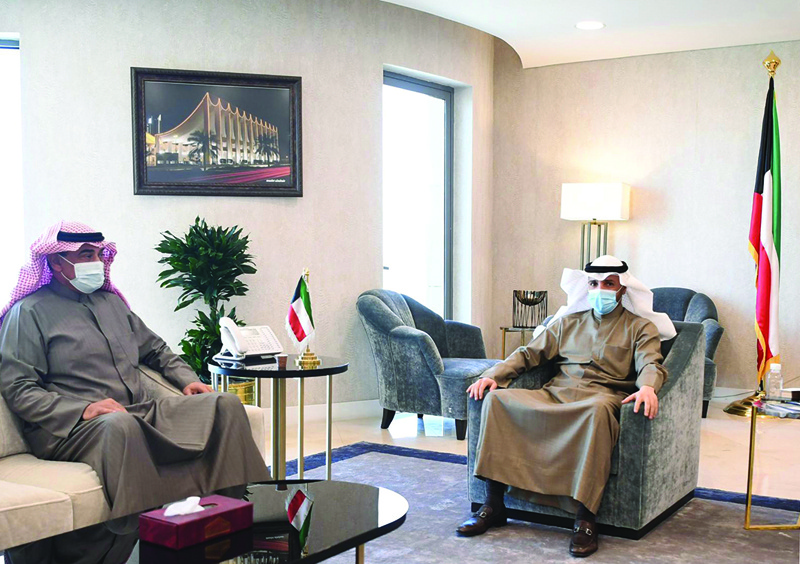 KUWAIT: National Assembly Speaker Marzouq Al-Ghanem meets at his office HH the Prime Minister Sheikh Sabah Al-Khaled Al-Hamad Al-Sabah yesterday. - KUNA
KUWAIT: National Assembly Speaker Marzouq Al-Ghanem meets at his office HH the Prime Minister Sheikh Sabah Al-Khaled Al-Hamad Al-Sabah yesterday. - KUNABy B Izzak
KUWAIT: HH the Prime Minister Sheikh Sabah Al-Khaled Al-Sabah yesterday held talks with National Assembly Speaker Marzouq Al-Ghanem and a number of lawmakers over the formation of the next Cabinet, a day after striking a deal with opposition MPs. Sheikh Sabah said last week that he will meet various blocs in the Assembly and other MPs for consultation talks over the shape of the new Cabinet.
On Monday, he met members of the so-called group of 16, consisting of opposition members, and struck a deal with them to accept their proposed draft laws, mainly approving a general amnesty law covering former opposition MPs and activists who have been living in exile for over 30 months to avoid jail terms.
The government also pledged to approve draft laws to amend the election law, the cybercrimes law and others. The government also agreed to form a coordination committee with opposition MPs to cooperate and coordinate on various issues. Opposition MPs welcomed the government move and immediately named four lawmakers: Bader Al-Mulla, Abdullah Al-Mudhaf, Hamad Al-Matar and Mubarak Al-Mutairi as members of the agreed coordination committee.
At the same time, the Assembly's legal and legislative committee reviewed a number of bills calling for a general amnesty for people jailed for political reasons. The panel asked its technical office to prepare a unified bill and report within a week to vote on it and send it to the Assembly for debate.
Rapporteur of the committee MP Muhannad Al-Sayer said the panel also reviewed a draft law calling to change the Assembly's charter to make voting for the Assembly speaker public by calling out the names of MPs. A few weeks ago, the country was headed into political turmoil after the Cabinet resigned a few days after three opposition MPs filed to grill the prime minister. The resignation was accepted by HH the Amir, who later renamed Sheikh Sabah to form the new Cabinet.
MP Abdullah Al-Turaiji, who met the prime minister yesterday, said on Twitter that Sheikh Sabah showed "serious willingness" to reach an agreement with the Assembly over proposed draft laws. He said he called for the need to complete the national reconciliation to allow those in exile to return, and "the premier showed understanding to settle this issue".
But two Shiite MPs, Adnan Abdulsamad and Ahmad Al-Hamad, said any general amnesty must include a group of Shiite prisoners who were convicted of forming a spy cell accused of collaborating with Iran. The cell members, locally known as Abdaly Cell, were handed hefty jail terms for possessing of large quantities of arms, smuggling weapons and explosives from Iran and undergoing military training in Hezbollah camps in Lebanon.
The members told the court that the arms they had were collected during the 1990-91 Iraqi invasion and denied other charges. Abdulsamad said after meeting the prime minister yesterday that any pardon must be total and comprehensive and must include members of the Abdaly Cell. He said the media had inflated the case, which was merely a possession of arms from the time of the Iraqi invasion. Hamad said any national reconciliation must not be selective and should include everyone.









